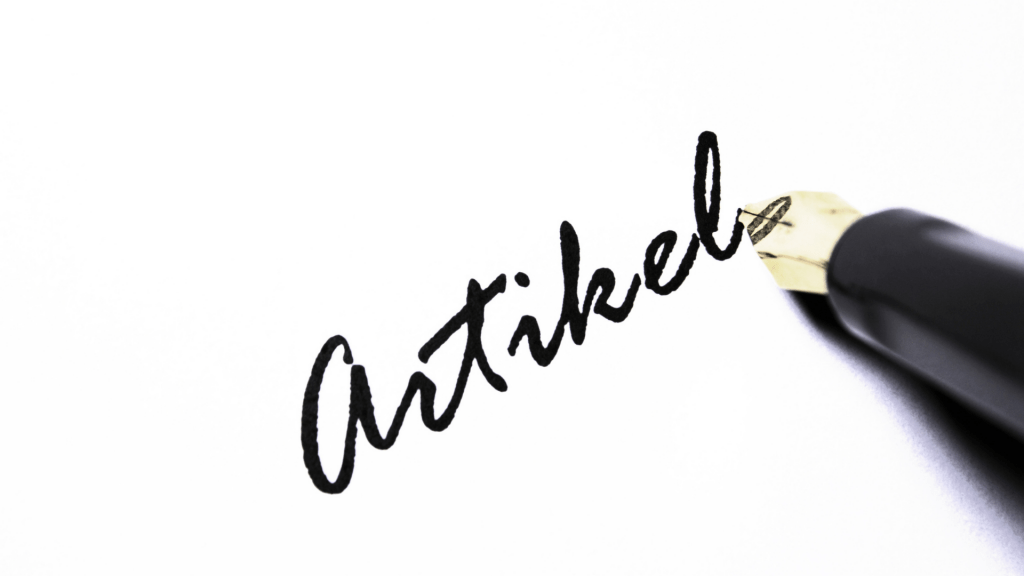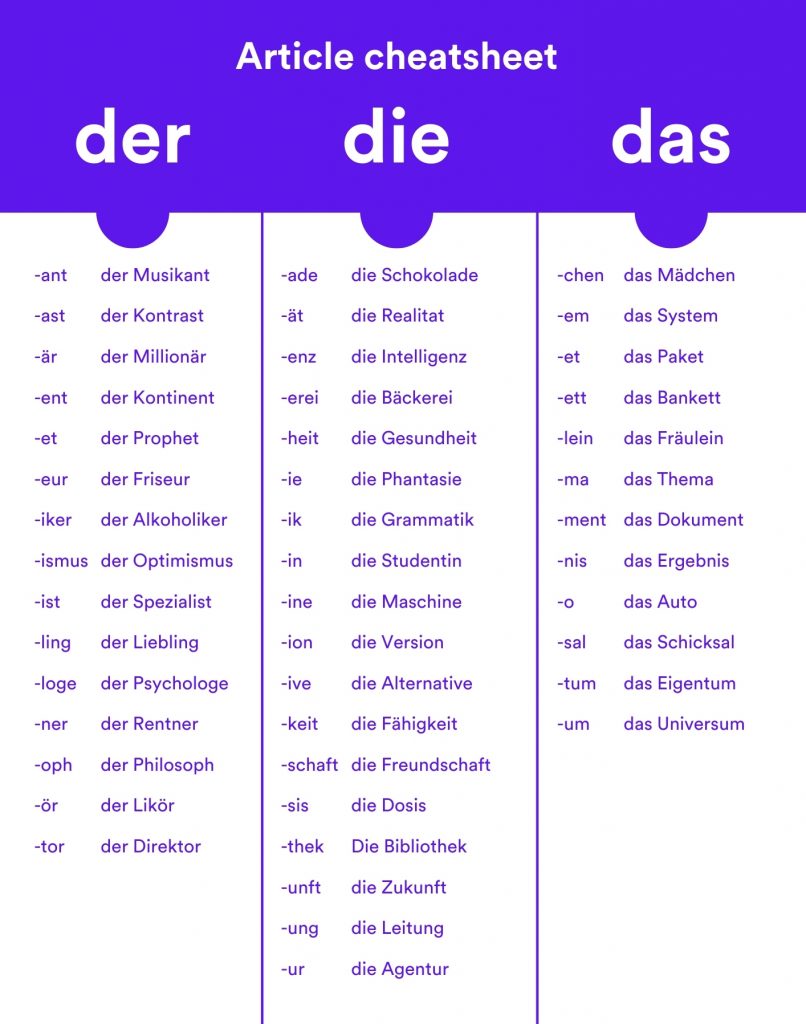Der, die or das? When to use the definite or indefinite article? How to determine the gender of a noun and how to use German articles? Almost all nouns in German are preceded by a small word that scares even native speakers, but we are not intimidated!

Masculine gender
by object
- male persons – der Mann (man), der Junge (boy)
- male animals – der Bär (bear)
- cardinal points – der Norden (north)
- seasons – der Sommer (summer), der Winter (winter)
- names of months – der Januar (January), der Mai (May), der September (September)
- days of the week – der Montag (Monday), der Mittwoch (Wednesday), der Sonntag (Sunday)
- times of day – der Morgen (morning), but die Nacht (night)
- precipitation – der Regen (rain), der Schnee (snow)
- minerals – der Granit (granite)
- stones – der Rubin (ruby)
- the names of the mountains – der Harz (Harz)
- names of lakes – der Müritz (Müritz)
- alcoholic drinks – der Wodka (vodka), der Sekt (sparkling wine), but das Bier (beer)
- monetary units – der Euro (euro), die Krone (crown), die Mark (mark)
- celestial bodies – der Mond (moon), but die Venus (venus), die Sonne (sun)
- names of car brands – der Opel, der BMW
By ending
Nouns with suffixes:
- -er – der Fahrer (driver)
- -ler – der Sportler (sportsman)
- -ner – der Gärtner (gardener)
- -ling – der Lehrling (student)
- -s – der Fuchs (fox)
Note: Do not confuse the <-er> suffix in derived nouns with words ending in <-er>: die Mutter, die Tochter, das Fenster, etc.
Foreign words with suffixes:
- -ent – der Student (student)
- -ant – der Laborant (laboratory assistant)
- -ist – der Publizist (publicist)
- -et – der Poet (poet)
- -ot – der Pilot (pilot)
- -at – der Kandidat (candidate)
- -soph – der Philosoph (philosopher)
- -nom – der Astronom (astronomer)
- -graph – der Photograph (photographer)
- -eur – der Ingenieur (engineer)
- -ier – der Pionier (pioneer)
- -ar – der Jubilar (jubilee)
- -är – der Sekretär (secretary)
- -or – der Doktor (doctor)
Feminine gender
By object
- female persons – die Frau (woman), but das Mädchen (girl/see neuter)
- female animals – die Kuh (cow), but das Huhn (chicken), das Schaf (sheep)
- the names of the trees – die Birke (birch), but der Ahorn (maple)
- color names – die Aster (aster), but der Mohn (poppy), der Kaktus (cactus)
- the names of the berries – die Himbeere (raspberry)
- the name of fruits and vegetables – die Birne (pear), but der Apfel (apple), der Pfirsich (peach), der Kohl (cabbage), der Kürbis (pumpkin)
- most German rivers – die Elbe, die Oder, die Spree, but der Rhein, der Main, der Neckar
By ending
Nouns with suffixes:
- -in – die Laborantin (laboratory assistant)
- -ung – die Übung (exercise)
- -heit – die Freiheit (freedom)
- -keit – die Möglichkeit (opportunity)
- -schaft – die Landschaft (terrain)
- -ei – die Malerei (painting)
Foreign words with stressed suffixes:
- -ie – die Chemie (chemistry)
- -tät – die Universität (university)
- -tion – die Station (station)
- -ur – die Kultur (culture)
- -ik – die Physik (physics)
- -age – die Reportage (reportage)
- -ade – die Fassade (facade)
- -anz – die Ambulanz (ambulance)
- -enz – die Existenz (existence)
Most nouns with ending in -e:
- die Liebe (love)
- die Kälte (cold)
- die Hilfe (help)
- die Lampe (lamp)
Note: There are also a number of masculine nouns ending in -e: der Kollege, der Junge, der Name, der Gedanke, der Käse and several neuter nouns: das Ende, das Interesse, das Auge.
Neuter gender
Nouns with suffixes:
- -chen – das Mädchen (girl)
- -lein – das Tischlein (table)
- -(s)tel – das Fünftel (one-fifth)
Most nouns with suffixes:
- -tum
- das Eigentum (property), but der Reichtum, der Irrtum
- -nis
- das Verhältnis (relation), but die Kenntnis, die Erlaubnis
Foreign words (objects and abstract concepts) ending in:
- -(i)um – das Stadium (stadium)
- -ett – das Kabinett (cabinet)
- -ment – das Dokument (document)
- -ma – das Drama (drama)
- -o – das Kino (cinema)
Nouns with the Ge- prefix:
- das Gewässer (waters/stretch of water)
- das Gebirge (mountain range)
- das Gemälde (painting)
Nouns formed from verbs:
- das Laufen (run) – from laufen (to run)
- das Lesen (read) – from lesen (to read)

Do you want to get your German language learning planner?
Dive into a World of German Mastery with Leo. Over 7500 enthusiasts are already unlocking the secrets to fluency with our tailored strategies, tips, and now, the German language learning planner. Secure yours today and transform your language journey with me!







1 comment
Quite helpful!
Comments are closed.